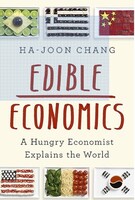Book notes: Edible Economics
Oct 11, 2023
By Ha-Joon Chang.
Got this as a Christmas gift.
Favorite fact: Koreans consume 7.5 kg of garlic per person per year. (10x times as much as Italians.)
This book is a fun lesson in economics using foods as a metaphor. Only the smallest nit to pick: The correlation between the food and the point being made was sometimes tenuous. Otherwise the book is overwhelmingly delightful and informative. The main lesson is to look at economic issues from more than one point of view, similar to how you would taste foods from different cultures.
Overcoming Prejudices
- Acorn. Overcoming cultural prejudices when explaining economic conditions (e.g. lazy). I’m curious to try dotorimuk (acorn jelly). I’ve eaten Jamón ibérico before but now I’ll actually slow down and taste it.
- Okra. Brought from Africa. It’s tricky to define “Economic Freedom”. We need to make capitalism a more humane system.
- Coconut. People assume coconut-growing countries are poor because they live in nice weather with bountiful natural resources. Not true, rather there are “historical, political, and tech forces beyond their control.”
Becoming More Productive
- Anchovies. There is anchovy in worcestershire sauce, who knew? A nation has more sustained wealth from manufacturing than natural resource extraction (like anchovies, or coffee).
- Prawn. Prawns are different than shrimp, who knew? It takes at least 2 decades for a country to develop an industry, and they have to protect it with tariffs and the population has to suffer a sub-par product for a while (e.g. Japan and car manufacturing). Called an “infant industry”, grow an industry like a child.
- Noodle. Business success stories are more a function of society (industry protection and public investment) than individual brilliance. E.g. Hyundai. The USA was an early adopter of “infant industry protection”.
- Carrot. “Patent thickets” that prevent innovation. We should reform the patent system. Shorter lengths? Prize instead of protection?
Doing Better Globally
- Beef. Latin American countries were forced to sign unequal treaties: low tariffs for their imports (free trade), but high tariffs for their exports. Any country with the ability to control tariffs will always protect their industries.
- Banana. Bananas are grown by grafting and can no longer reproduce by natural means. A multinational corporation with outsize influence can create “Banana Republics”. Countries must insist on using local labor and knowledge transfer so it’s good for both parties.
- Coca-cola. (Not a food?) Neo-liberal policies from wealthy countries haven’t worked out as well as we think.
Living Together
- Rye. The importance of social insurances. The first public health insurance was in Bismark in 1883.
- Chicken. Discussing inequality in terms of opportunities and outcomes. Opportunities: everyone has a chance to live the American dream if they work hard. Outcomes: there should be a redistribution or extra help to those who are marginalized to fairly compete for better outcomes.
- Chili. GDP does not include unpaid care work done by the community (mostly women). If so it would be 30-40% higher.
Thinking About the Future
- Lime. The British introduced limes to their navy diet in an organized way to eradicate scurvy (they thought the sourness was what did it, so they preferred limes to lemons even though they have 1/2 the vitamin-C). It wouldn’t work if they left it to individual choice. We need to think the same institutional way to solve climate change.
- Spices. We should reform Limited Liability Corporations (LLCs) to think more long term. Timed voting (your vote becomes stronger the longer you hold the share). More stakeholder voices on the board.
- Strawberry. Automation usually creates as many jobs as it takes away, but devastating for the job loser. Need retraining programs.
- Chocolate. The most important determinant of a countries living standard is the ability to provide manufactured goods competitively. Not services. USA and UK have ignored their manufacturing sector for too long. Look to Switzerland as an example.